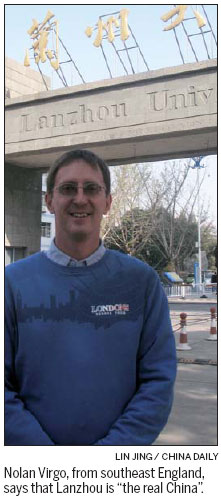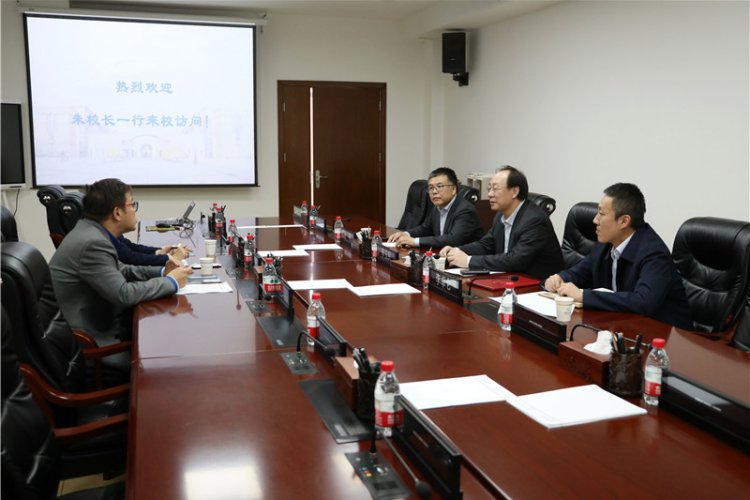
On Nov. 23, Lin Jing and Xue Chaohua from “China Daily” published the article titled as “Blurring the lines:Vibrant expatriate community discovers the taste of real China in Lanzhou” at http://europe.chinadaily.com.cn/epaper/2012-11/23/content_15952543.htm after interviewing Nolan Virgo, a British teacher of Lanzhou University from Crawley, in southeast England. Virgo,the beef-noodles-a-holic, feels that in many ways Lanzhou reflects "the real China". "Most of the eastern cities, like Shanghai or Xiamen, have always had Western influences. They have always been influenced from a business and life perspective. In contrast, Lanzhou has more or less remained a traditional Chinese city," says 39-year-old Virgo.
After two years in Kunming, Virgo and his wife came to Lanzhou University in 2002 when he found that tuition fees for studying Chinese in Lanzhou University were lower and the city provided a better learning environment. "I made the decision to move to Lanzhou 10 years ago as I felt that it would give me a chance to make more friends with the Chinese people and also to hone my language skills." The real problem in learning Chinese in Kunming was that there are several local dialects spoken there, and some of them are hard to understand, he says. "I chose Lanzhou because it is a quiet place and does not have too many distractions. It is also an easy place for study. The people in Lanzhou barely speak English and hence it is an ideal destination for practicing Chinese." He now works as the international coordinator for the Cuiying Honors College of Lanzhou University. It was founded in August 2010 as part of China's undergraduate training program, and financed by the Ministry of Education and Ministry of Finance. Only the top 2 percent of the most outstanding students, or about 120 students, are admitted to the program every year.
Full Text:
Blurring the lines:
Vibrant expatriate community discovers the taste of real China in Lanzhou
Nolan Virgo, a British teacher from Crawley, in southeast England, feels that in many ways Lanzhou reflects "the real China". "Most of the eastern cities, like Shanghai or Xiamen, have always had Western influences. They have always been influenced from a business and life perspective. In contrast, Lanzhou has more or less remained a traditional Chinese city," says 39-year-old Virgo. "In some cities, people eat sandwiches and have Starbucks and are more used to Western things. But in Lanzhou, these are not common. People still maintain the traditional habits, both in life and business."
Before coming to Lanzhou, Virgo knew that the city was less developed and more traditional compared with big cities such as Beijing and Shanghai. "Though local people are relatively shy, they are very welcoming. I remember going to a restaurant many years ago and finding the waiter too nervous to serve me, as he thought I was going to speak English with them. Another time, a waiter was shaking and not able to put the cup on my saucer without spilling it," he says.
Virgo's interest in China can be traced back to his childhood. "My father's favorite food was Chinese food. My mother's best friend was a Chinese person living in my hometown." After graduation from Southampton University and teaching mathematics for a while, he moved to China with his then fiance to work in Yunnan province. "Yunnan is similar to England in some ways. It rains often, and the cool climate was similar to my hometown. The trees are always green in Kunming."
But after two years in Kunming, Virgo moved to Lanzhou when he found that tuition fees for studying Chinese in Lanzhou University were lower and the city provided a better learning environment. "I made the decision to move to Lanzhou 10 years ago as I felt that it would give me a chance to make more friends with the Chinese people and also to hone my language skills." The real problem in learning Chinese in Kunming was that there are several local dialects spoken there, and some of them are hard to understand, he says. Paul Maley, 26, from Russia, who is studying for his master's degree in international relationships at the Lanzhou University, agrees.
"I chose Lanzhou because it is a quiet place and does not have too many distractions. It is also an easy place for study. The people in Lanzhou barely speak English and hence it is an ideal destination for practicing Chinese." Virgo and his wife came to Lanzhou University in 2002 and have not only been studying Chinese, but also teaching English at different universities in Lanzhou. "I found that the English learning skills of my graduate students were much better than my Chinese. It was very embarrassing because they have never been abroad to study English," he admits. "When I first came to China, I used to spend an entire day trying to buy something I needed, and could not find it as I did not know where to go. "Sometimes I had to draw what I wanted to the shopkeepers, or use my hands to explain. Sometimes, I also had to walk out of the shops, unsuccessful." He says that under pressure he would find some quiet place "to escape China". He would go to a cafe, where the menu was in English, and where nobody would talk to him.
But thanks to living in Lanzhou, he is now able to communicate fluently with the local people. "Living in China is not stressful anymore, but learning the language is really the key to the entire process," Virgo says. He also acquired some local tastes, like having beef noodles for breakfast. In Lanzhou, beef noodle restaurants are everywhere and often regarded as the "Chinese McDonald's". "When I first came here for beef noodles, I found it very spicy and oily. But I have grown to like the flavor. Though I do travel to other areas occasionally, I still think Lanzhou provides the best food. "This is especially so during winter, as there is nothing like a bowl of hot beef noodles that really warms you up." Virgo says Lanzhou has really been transformed since he arrived 10 years ago. "In the past there were many minibuses and bicycles on the road, and the traffic was really crazy. Bicycles would squeeze into any small gaps in the street, as if there were no rules."The air was dirty because of the coal bricks burning in every little restaurant. But it is much cleaner now with most using gas, he says. "It is like night and day compared to the past."Daniel Kuttner, a German executive sous-chef at Crown Plaza in Lanzhou, says the most significant feature of Lanzhou is the mixture of the old and the new."You can see mountains with rivers, and you can see the modern skyscrapers and old apartments blocks standing side by side."
Virgo works as the international coordinator for the Cuiying Honors College of Lanzhou University. It was founded in August 2010 as part of China's undergraduate training program, and financed by the Ministry of Education and Ministry of Finance.Only the top 2 percent of the most outstanding students, or about 120 students, are admitted to the program every year.
Virgo has two daughters aged 8 and 10. He says that when they are old enough for high school, the family may consider moving back to England. But for the time being, he plans to stay here for another five years. "For me, Lanzhou is in many ways home. I am so used to it and have many friends here. I am more used to the life in Lanzhou, than to the life in my home country." In his spare time, he likes to walk by the Yellow River and go to a teahouse in the mountains or have barbecues with his family and friends on Xujia Mountain. Horse riding in the mountains is another favorite pastime.
He says that the city is developing very fast due to low labor costs and abundant raw materials. But that also means a lot needs to be done to improve urban transportation. Like the Yellow River, Lanzhou also assumes various forms depending on traffic flow and narrow roads, he says. "In Lanzhou, sometimes I have to squeeze onto a bus during rush hour. On a bad day, you can spend more than one hour crossing the city. When you set out, you will never know whether the traffic will be bad or good. "I am looking forward to having some light rail in the city, either a subway or a fast rail system. I think it will make travel in the city faster and more convenient."
(China Daily 11/23/2012 page16)




